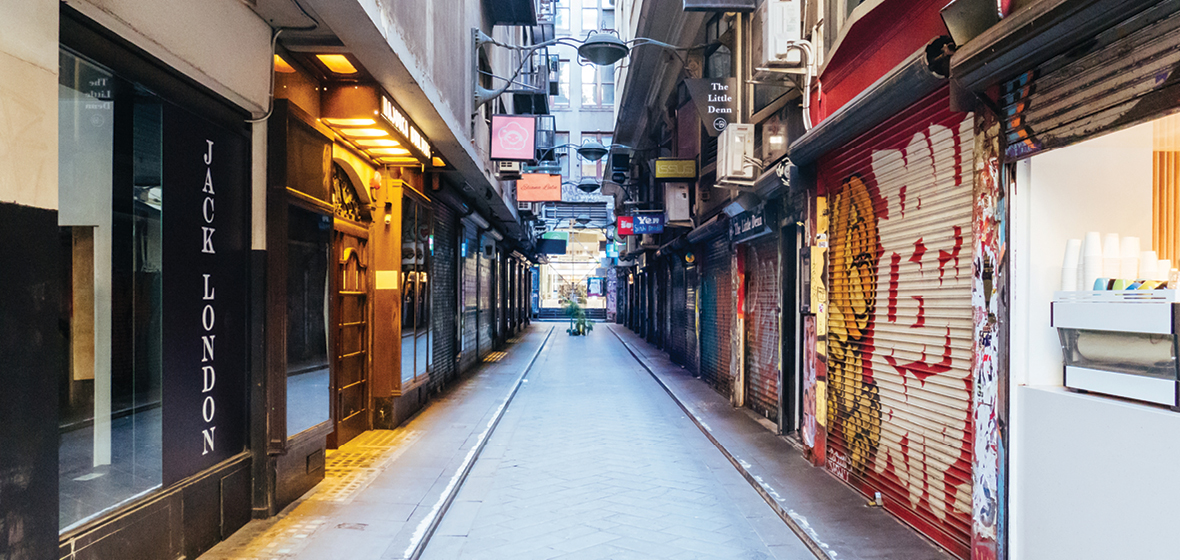Small businesses in Victoria have been decimated by a second wave of coronavirus that may have stemmed from the state government’s botched hotel quarantine program. A Sydney law firm recently launched a multibillion-dollar class action to recover economic losses from the Victorian government. But whether the case goes ahead – and where the money will come from – is murky.
Victorian small business owner Kevin Slattery has had a rough six months.
After managing and growing his panel-beating business, Cranbourne Body Works, for more than 30 years in southeast Melbourne, he watched his bottom line take hit after hit during the COVID-19 pandemic. He says revenue dropped off a cliff when the second lockdown hit.
“The first lockdown wasn’t this bad because we had a backlog of cars to fix. It didn’t really affect us until the second wave came along,” he told LSJ.
“When the second lockdown was announced, I was devastated.”
In a state that now has some of the strictest lockdown laws in the world, Slattery is only allowed to fix the cars of “essential workers” like police and healthcare personnel. His monthly revenue fell from about $400,000 to less than $30,000.
He stood down eight staff and laid off two. Where he would usually fix about 120 cars each month, he says he is now lucky to serve 15 customers.
While Slattery doesn’t blame the government for the pandemic itself, he is one of many small business owners in Victoria seeking answers for the government’s botched hotel quarantine system that many are saying prompted the second wave of COVID-19.
Damning witness testimony given at the COVID-19 Hotel Quarantine Inquiry has included stories of contracted security guards showing up for shifts with little or no training, taking food from bags left for travellers, cutting holes in sterile gloves to use their phones, and even engaging in sexual relations. Genomic sequencing data showed nearly all of Victoria’s latest coronavirus cases could be linked back to returned travellers.
“Small businesses shouldn’t be footing the bill for the government’s failure. We’ve got rent to pay, loans, debts,” Slattery said.
“The government should be paying for the damage.”
The class action Victoria had to have
In a city of five million people that prides itself on cafes, restaurants, nightlife and live sport, Melbourne’s latest “Level Four” lockdown restrictions have decimated small businesses like Slattery’s. One estimate by SGS Economics and Planning clocks Victoria’s losses at between $300 and $400 million a day in reduced economic activity.
It’s perhaps unsurprising, then, that murmurs of businesses seeking compensation from the Victorian Government have been bubbling away since the failures of hotel quarantine began to be exposed by inquiry hearings in July.
In August, Sydney law firm Quinn Emanual Urquhart & Sullivan fired the first legal shots by filing a class action against the government in the Victorian Supreme Court.
Firm partner Damian Scattini, who led the landmark class action against the Queensland government over negligence related to the 2011 floods, told LSJ his firm had been inundated with calls and emails from small business owners seeking compensation for the quarantine debacle. Hundreds of individuals registered within a week of his filing the lawsuit and publishing a callout for group members online.
“It’s pretty terrible, the stories are devastating,” Scattini told LSJ. “One gym owner was earning $10,000 a week, now he’s down to about $50 a week. The lead plaintiff is a restaurant owner now working in construction to simply make ends meet. He has lost thousands per week.”
Scattini acknowledged the first, Australia-wide, lockdown that began in March was necessary. But he pointed to the subsequent success of NSW and other states as evidence that the Victorian government had uniquely failed in its duty to undertake the hotel quarantine system with proper care.
“We make no complaints about government decisions; we don’t protest the lockdown or the hotel quarantine as decisions made to protect the health of Victorians,” he said.
“However, when the government made the decision to run a mandatory hotel quarantine system, it took on a duty to ensure proper training and procedures were in place for that system. The evidence coming out of the hotel quarantine inquiry indicates there were serious breaches of that responsibility.”
Will the case succeed?
Dean of Swinburne University Law School Mirko Bagaric told LSJ there was precedent for groups suing governments in similar situations. The most recent example is the Robodebt case being led by Melbourne firm Gordon Legal, which is still seeking millions of dollars in compensation for victims of unlawful Centrelink debt claims. Other past successful class actions have claimed compensation from state governments on behalf of Indigenous groups affected by the Stolen Generations.
Bagaric said evidence coming out of the hotel quarantine inquiry indicated a hotel quarantine class action was likely to succeed.
“There’s no rulebook for dealing with a pandemic but one thing seems obvious: when faced with the greatest biosecurity risk of your life, you need trained professionals to run the quarantine process,” he told LSJ.
“Negligence looks at the degree of vulnerability of the plaintiff – so, how vulnerable was the plaintiff to the impacts of the second wave and second lockdown? I think we can fairly say businesses are completely vulnerable to lockdown. Many had no choice but to close.”
Where will the money come from?
Bagaric said a successful class action could claim damages “in the billions of dollars” and be “devastating for the government”.
Scattini agreed, estimating up to 65,000 Victorian businesses may be eligible to join as group members in the action his firm is leading.
Governments faced with such exorbitant liability risks have two options: either pay the damages out of taxpayer dollars – which are already being crippled by the COVID-19 recession – or legislate retrospectively to abolish liability.
The Western Australian government took this extraordinary second option in August by legislating to block Clive Palmer from taking it to court over a $30 billion damages claim for border closures preventing a lucrative mining contract his company had made with a Chinese company. This option is cheaper but legally and politically problematic.
“Retrospective legislation goes against important principles like the rule of law. But that hasn’t stopped the government so far during the pandemic,” Bagaric said.
“The government has been quick to abolish rights and civil liberties – just go through the International Covenant on Civil and Political Rights and you will see every freedom has been restricted. Freedom of movement, freedom to protest, freedom of speech, rights to fresh air and exercise.
“The irony is that Victoria is the only state in Australia with a bill of rights,” he added.
The other irony is the Victorian Parliament in June passed laws to allow contingency fees to be recovered as costs in class actions. It is the first Australian jurisdiction to do so, allowing law firms to offer plaintiffs a “no win, no fee” arrangement.
This essentially removes financial barriers and risk for small businesspeople like Slattery to take the government to court.
Slattery said he was considering joining the class action led by Quinn Emanual Urquhart & Sullivan.
“I am appalled by the way the state government has handled this. Lessons need to be learnt,” he told LSJ.
“How else do you teach a government a lesson other than reacting in a legal way?”
Main image: August 29, 2020; Degraves Street and Flinders Lane in the Melbourne CBD are deserted amid the “Stage 4” lockdown of the Melbourne metrpolitan area. All regions in Victoria are in varying stages of lockdown after a second wave of COVID-19 infections. © iStockphoto LP.




